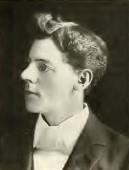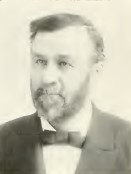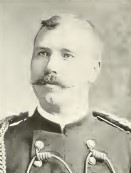|
Progressive Men of Minnesota
Minneapolis Journal
1897
 CLEMENT STANISLAUS
EDWARDS. The early history of Clement Stanislaus Edwards
contains a mystery, which thus far he has never been
able to solve. When about fifteen months old he was left
by a lady who claimed to be his mother with a family
consisting of a widow and three children in Chatham, New
Brunswick, Dominion of Canada. The lady who left him
there stated that she was his mother: that this family
had been recommended by the bishop of the diocese; that
she wished good care taken of him until her return, and
that she was about to start to India where her husband
had gone as an officer in the British army. She stated that
her child was born March 4, 1869. She never returned and
Mr. Edwards has never been able to secure any further
information regarding his parents. He learned to look
upon the humble people with whom he had been left as his
kinsfolk, and this delusion on his part was encouraged.
At the end of six years he was placed at a private
school for three years, and later at a day school
conducted by the Christian Brothers. The first year
Clement won a prize providing for a year’s tuition and
boarding, and all the privileges of the academy on
St.
Michael’s Mount. He spent the next year in that
boarding school, where he made such progress that he was
allowed to remain a second year. He was now about
twelve years of age, and, being of an adventurous
disposition, he went to New York City whither the
children of the widow with whom he that grown up, had
preceded him.
He found their
circumstances such that it was necessary for him to rely
upon his own resources, and about this time he learned
also of the death of their mother, who had always been
the personification of kindness and love towards him.
This sad blow took from him his only friend. CLEMENT STANISLAUS
EDWARDS. The early history of Clement Stanislaus Edwards
contains a mystery, which thus far he has never been
able to solve. When about fifteen months old he was left
by a lady who claimed to be his mother with a family
consisting of a widow and three children in Chatham, New
Brunswick, Dominion of Canada. The lady who left him
there stated that she was his mother: that this family
had been recommended by the bishop of the diocese; that
she wished good care taken of him until her return, and
that she was about to start to India where her husband
had gone as an officer in the British army. She stated that
her child was born March 4, 1869. She never returned and
Mr. Edwards has never been able to secure any further
information regarding his parents. He learned to look
upon the humble people with whom he had been left as his
kinsfolk, and this delusion on his part was encouraged.
At the end of six years he was placed at a private
school for three years, and later at a day school
conducted by the Christian Brothers. The first year
Clement won a prize providing for a year’s tuition and
boarding, and all the privileges of the academy on
St.
Michael’s Mount. He spent the next year in that
boarding school, where he made such progress that he was
allowed to remain a second year. He was now about
twelve years of age, and, being of an adventurous
disposition, he went to New York City whither the
children of the widow with whom he that grown up, had
preceded him.
He found their
circumstances such that it was necessary for him to rely
upon his own resources, and about this time he learned
also of the death of their mother, who had always been
the personification of kindness and love towards him.
This sad blow took from him his only friend.
Alone in
the great city, without money or friends, he secured
employment as a cash boy in a large dry goods store, his
compensation being two dollars a week, upon which he was
obliged to live. After a short time he found employment
as a clerk for a real estate broker with the more
liberal compensation of three dollars a week, and
correspondingly greater luxury in his mode of living. He
remained in this position for about a year, when through
a disagreement with his employer he left his service,
and finding himself without food or shelter he acted
upon the advice given on a street sign, upon which he
read, “Children’s Aid Society,” and applied for
assistance. He was informed that this assistance
consisted in transportation out West, and a chance to
find a home. He, along with a considerable assignment of
stranded humanity, accepted this aid, and on the
following day started with an officer of the society for
Albert Lea, where they arrived November 17, 1881. The
children were taken to the courthouse where was
assembled a large company of farmers, some having come a
hundred miles to make a selection of a son or a daughter
among these waifs. Clement was selected by a man from
Caledonia, but he was weary of travel and preferred
rather to remain with G. O. Slocum, of Albert Lea, who
proposed to take him into his home to work for his board
and schooling.
Mr. Slocum’s house
was his home for a number of years, where he was
encouraged in his studies and permitted to make the most
of every opportunity. He was an apt
scholar, and after passing through the various grades,
including one year’s attendance at the high school, he
secured employment in the office of the Freeborn County
Standard, where he learned the art of printing. Later he served
an apprenticeship in Minneapolis on the Daily Market
Record, being employed by Col. Rogers, the publisher of
that paper, for about three years. Clement had practiced
careful economy with a view to taking a college course,
and in 1888 entered Parker College, at Winnebago City,
where he remained two years, preparing for the ministry.
While there he regularly filled the pulpit in the Free
Will Baptist church at Janesville.
In 1890 he
entered Hillsdale College, Michigan, for the purpose of
continuing his preparation for the ministry, but, having
in the meantime concluded to adopt the legal profession,
and an opportunity presenting itself to take up his
legal studies, he returned to Albert Lea and began the
study of law in the office of Lovely & Morgan, in
January, 1891 he was admitted to the bar April 3, 1894
and at once entered into partnership with Hon. John
A. Lovely.
In the spring of 1895 he was elected city attorney of
Albert Lea, which position he now holds. A few months
later the partnership of Lovely & Edwards was
dissolved by mutual consent. Mr. Edwards is an active
and loyal Republican, was a member of the Phi Delta
Theta fraternity in college; also occupied the chair of
Chancellor Commander, and is at present District Deputy
Grand Chancellor of the Knights of Pythias. He is first
lieutenant of Company I. National Guards, and is a member of the Albert
Lea Presbyterian church. He was married September 12,
1894 to Harriet, daughter of Victor Gillrup mayor of
Albert Lea.
 JOHN LA PORTE GIBBS The
present Lieutenant-Governor of Minnesota is John La
Porte Gibbs. Mr. Gibbs was born of Colonial ancestry.
His progenitors were pioneers of the states of
Massachusetts and Connecticut, his father’s ancestors
having settled in the former, and the mother’s in the
latter, over two hundred years ago. In the long and
fierce struggle for American independence, both the
great grandfather and the grandfather of our subject
were active participants, serving in a Massachusetts
regiment. Grandfather Elijah Gibbs was a successful and
wealthy farmer, and left his children well provided for.
His son Eli, the father of the subject of this sketch,
also followed the occupation of farming, and was in
addition engaged in the lumbering business on the
Susquehanna river.
He acquired considerable property, but failed
just previous to his death by having become responsible
for promissory notes of a large amount. His death was by
accidental drowning in the Susquehanna river, July 3,
1855. His wife’s maiden name was Caroline Atwood. JOHN LA PORTE GIBBS The
present Lieutenant-Governor of Minnesota is John La
Porte Gibbs. Mr. Gibbs was born of Colonial ancestry.
His progenitors were pioneers of the states of
Massachusetts and Connecticut, his father’s ancestors
having settled in the former, and the mother’s in the
latter, over two hundred years ago. In the long and
fierce struggle for American independence, both the
great grandfather and the grandfather of our subject
were active participants, serving in a Massachusetts
regiment. Grandfather Elijah Gibbs was a successful and
wealthy farmer, and left his children well provided for.
His son Eli, the father of the subject of this sketch,
also followed the occupation of farming, and was in
addition engaged in the lumbering business on the
Susquehanna river.
He acquired considerable property, but failed
just previous to his death by having become responsible
for promissory notes of a large amount. His death was by
accidental drowning in the Susquehanna river, July 3,
1855. His wife’s maiden name was Caroline Atwood.
Their son
John was born in Bradford County, Pennsylvania, May 3,
1838. The lad lived on his father’s farm and attended
the district schools of his native county. He graduated
from this institution in his twenty-second year, and
immediately went to Ann Arbor, entering the law
department of the University of Michigan. He graduated
from this department a year later, and came West to
carve out his fortune. He first crossed
the Mississippi river at Rock Island, Illinois, and
having no money in pocket or friends to aid him, set out
from this point on foot through the Hawkeye state,
working at such odd jobs of employment as he could
secure. He
finally wandered into Albert Lea, Minnesota, at that
time but a small village, and secured a position as
school teacher. His talents, having become recognized he
was elected the fall of the following year (1862) county
attorney. A year later he was elected on the Republican
ticket to the lower house of the legislature,
representing the counties of Freeborn, Steele and
Waseca.
Since that time Mr. Gibbs has been a
representative of his district in the legislature five
different times. He has been one of the most prominent
members of that body, and has been the author of a large
amount of important legislation. He was elected speaker
of the house in the session of 1877, and again in 1885.
In 1887
Governor McGill appointed him a member of the railroad
commission, and he was re-appointed the ensuing term by
Governor Merriam. In 1896 he was nominated by the
Republicans to the office of lieutenant-governor, and
was elected. Though having taken up the study of law for
the purpose of making that his profession, Mr. Gibbs has
never engaged in its practice. Shortly after his
location at Albert Lea he “took tip” a farm, and aside
from his duties to the state, the occupation of an
agriculturist has been his vocation since settling in
the North Star state. He is the owner of a large farm
near Geneva, in Freeborn County, which is twelve miles
from the nearest railroad’ station. His farm has been
conducted on the most improved scientific methods, and
it is at present one of the most prosperous farms in
Southern Minnesota. Dairying, however, is his chief
specialty, and he is recognized as one of the best
authorities on that subject in the state. He has
lectured at various times before farmers’ institutes,
contributing of his practical and scientific knowledge
on this subject to the benefit of his brother
agriculturists. Starting without a cent, Mr. Gibbs has
now become one of the successful and prosperous citizens
of the North Star state. He is prominent in
the counsels of the Republican party, with which he has
always affiliated, and is highly respected in the
community in which he lives, as well as in the state at
large, for his genial qualities and for the push and
enterprise which he has exhibited in his business life.
In 1868 he was married to Mrs. Martha P. Robson, widow
of Captain James Robson, of the Tenth Minnesota, who was
killed in the fall of 1862. They have no
children.
 ARTHUR EMMETT RANSOM A
good many disappointments have followed the
entertainment of the hope that someday a fortune might
be realized from the representations of attorneys who
claimed to have discovered the existence of large
fortunes in European countries to which American heirs
were entitled.
A. E. Ransom, however,
is one of the heirs to a fortune of eighteen million
pounds sterling lying in the Bank of England, about the
existence of which there is no doubt, but to which the
Ransom family in America have as yet been unable to
establish clear title. ARTHUR EMMETT RANSOM A
good many disappointments have followed the
entertainment of the hope that someday a fortune might
be realized from the representations of attorneys who
claimed to have discovered the existence of large
fortunes in European countries to which American heirs
were entitled.
A. E. Ransom, however,
is one of the heirs to a fortune of eighteen million
pounds sterling lying in the Bank of England, about the
existence of which there is no doubt, but to which the
Ransom family in America have as yet been unable to
establish clear title.
Mr. Ransom
is a native of Concord, Jefferson County, Wisconsin,
where he was born September 30, 1866, the son of
Nathaniel C. Ransom and Catherine Olivia Coggins
(Ransom). Nathaniel is now a resident of Milwaukee. He
was a member of the Forty-seventh Regiment, Wisconsin
Volunteers, Company H, and to his efforts in a large
degree is due the progress made thus far in establishing
the title of the Ransom family to the English property.
The Ransoms came from England in the early part of the
Eighteenth century.
Arthur E.
was educated in the public schools of Wisconsin and the
state university. He graduated from the high schools at
Unity, Wisconsin, in 1883, receiving first honors and
the prize for oratory. He entered the state university
with the class of 1888, in his eighteenth year. He was a
student at Madison when that institution was under the
direction of President J. W. Bascom. While at the
university he took a very active interest in the work in
the military department, which was in charge of a
regular army officer, thus insuring the best of
discipline, and has been almost continually connected
with the national guard work ever since.
He became a
member of Company E, of the Second Regiment, located at
Fond du Lac, then joined the Sheridan Guard, Company A,
of Milwaukee, remaining with them until the organization
of Company H, Fourth Regiment, Milwaukee, of which he
was made captain. In 1893 Major Ransom moved to Albert
Lea. He was elected captain of Company I, Second
Infantry, but resigned on December 15, 1895, on account
of business which kept him almost constantly away from
home, and accepted the position of aide-de-camp on the
staff of Governor Clough, with the rank of major. While
in Milwaukee, prior to his removal to Albert Lea, Mr.
Ransom was engaged in the capacity of private secretary
to Mr. Rockwell, of the Rockwell Manufacturing Company.
Upon his removal to Albert Lea, he became identified
with the Ransom Bros. Company, wholesale grocers, as
traveling salesman. He is widely acquainted in Southern
Minnesota and Northern Iowa. He had spent
some time in studying law with the intention of making
that his profession, but gave it up for the mercantile
business.
In that
connection he became an expert accountant, and at one
time had charge of the English course and bookkeeping
department of the McDonald Business Academy, in
Milwaukee. His first dollar was earned by teaching
school at Thorpe, Wisconsin, in 1883. In the fall of
1894, Mr. Ransom formed a partnership with Senator T. V.
Knatvold and H. C. Koontz, known as the Ransom-Knatvold
Manufacturing Company, for the manufacture of pipes.
This business was sold within a year to Chicago buvers.
He was chosen Chief of Police at Albert Lee during 1895,
and his administration of that department of public
service has been regarded as highly successful. During
the summer of 1896 the Albert Lea Gas Machine
Manufacturing Company was organized and Mr. Ransom was
made superintendent and general manager.
Mr. Ransom
has always been an enthusiastic Republican. He is a
member of the Knights of Pythias, became captain of
Division No. 21, Uniform Rank, at Albert Lea in 1894,
and in February, 1896, was unanimously elected major of
the Second Battalion, First Regiment. At the
encampment of the Uniform Rank, in Minneapolis, in
September, 1896, he was again promoted, receiving every
vote for colonel of the First Regiment. He is an
enthusiastic member of Browning Tent, No. 28, Knights of
the Maccabees, holding the position of Deputy Supreme
Commander in Minnesota, and on February 1, 1897, takes
up the duties of Supreme State Deputy of Northern Iowa,
having been appointed by Supreme Commander D. P.
Markey. He
is a member of the Minnesota Veterans’ Association. On
April 11, 1887, Mr. Ransom was
married at Fond du Lac, Wisconsin, to Miss Tillie
Gilman. They have four children, three sons and one
daughter.
The information
on Trails to the Past © Copyright may be used in personal family history research, with source citation. The pages in entirety may not be duplicated for publication in any fashion without the permission of the owner. Commercial use of any material on this site is not permitted. Please respect the wishes of those who have contributed their time and efforts to make this free site possible.~Thank you! |
|
|
|



